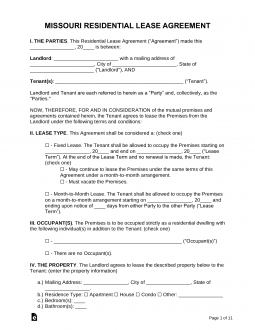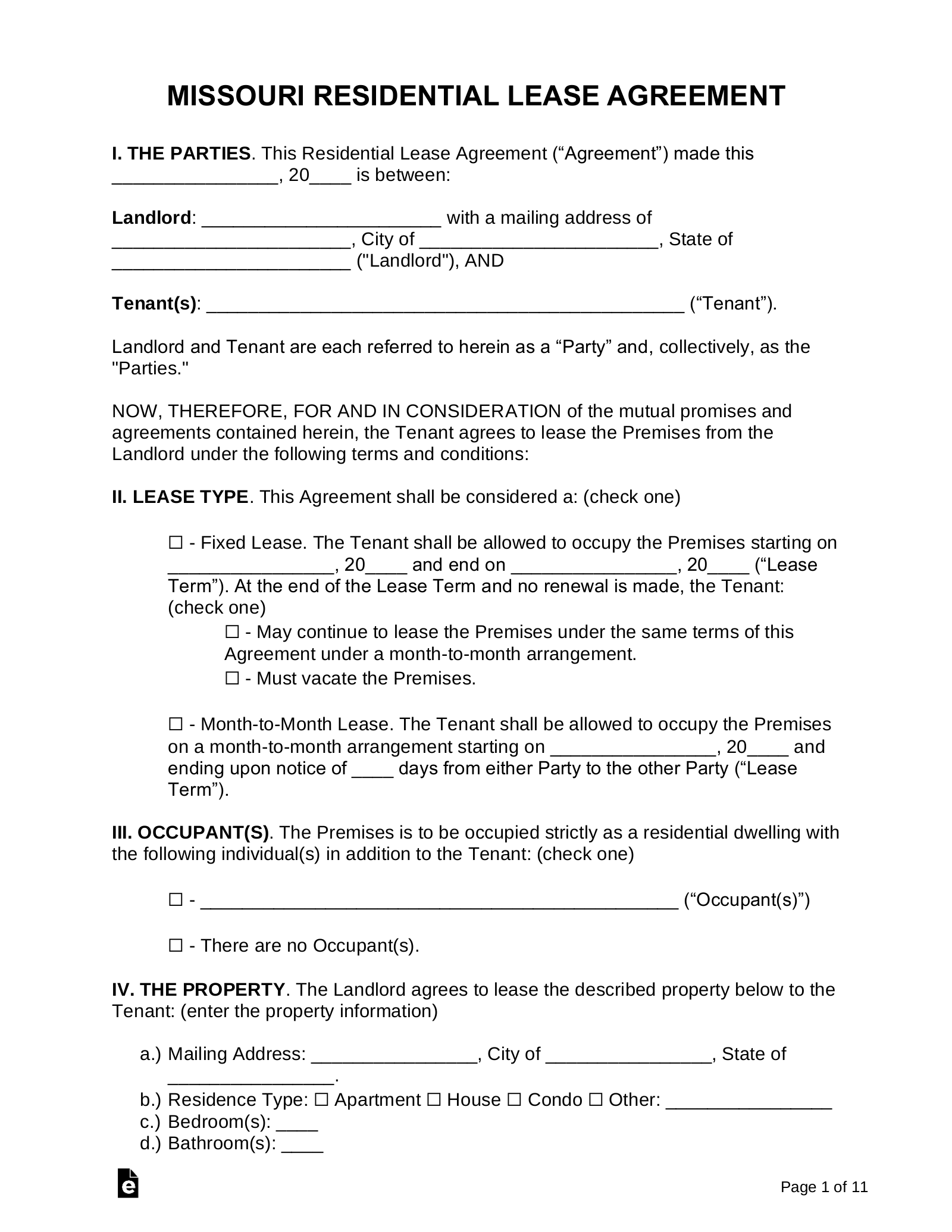Updated January 22, 2024
A Missouri lease agreement is written and agreed upon by a landlord and a tenant for a period of time and covers the exchange of a place to live or conduct business in exchange for the payment of rent. The tenant’s credit and income will most likely be verified by the landlord before a lease is signed. At lease signing, the tenant will be obligated to pay the first month’s rent and a security deposit (if any).
Table of Contents |
Agreement Types (8)
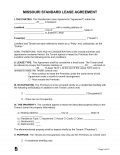 Standard Residential Lease Agreement – Fixed-term lease typically for a one-year agreement. Standard Residential Lease Agreement – Fixed-term lease typically for a one-year agreement.
Download: PDF, MS Word, OpenDocument |
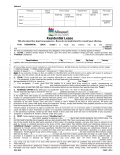 Association of Realtors Lease Agreement – To be used and written by a licensed Realtor when handling a transaction between a landlord and tenant. Association of Realtors Lease Agreement – To be used and written by a licensed Realtor when handling a transaction between a landlord and tenant.
Download: PDF |
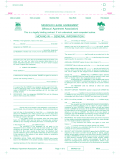 Apartment Association of Missouri Lease – For any standard fixed-term housing arrangement. Apartment Association of Missouri Lease – For any standard fixed-term housing arrangement.
Download: PDF |
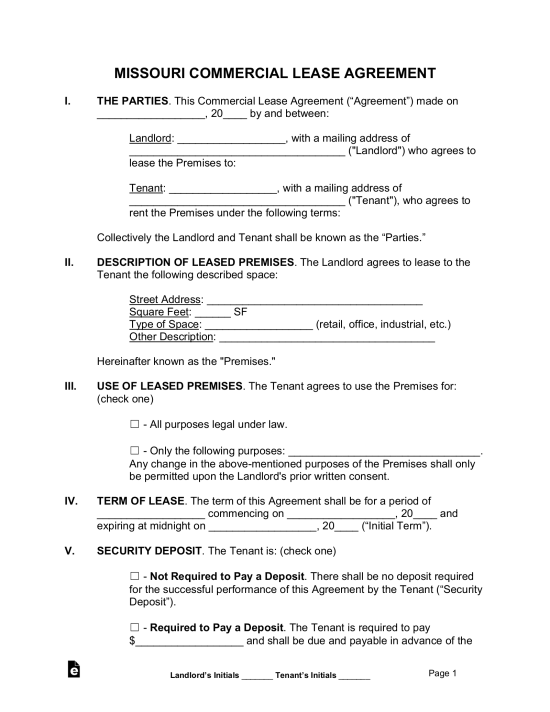 Commercial Lease Agreement – For any business-related use such as occupying retail, office, or industrial space. Commercial Lease Agreement – For any business-related use such as occupying retail, office, or industrial space.
Download: PDF, MS Word, OpenDocument |
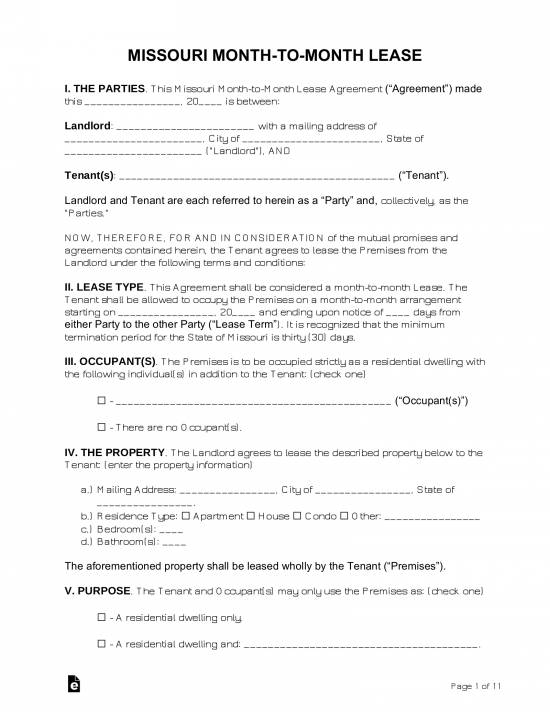 Month-to-Month Lease Agreement – Known as a tenancy at will and should be written according to Section 441.060 providing at least one month’s notice to cancel at any time. Month-to-Month Lease Agreement – Known as a tenancy at will and should be written according to Section 441.060 providing at least one month’s notice to cancel at any time.
Download: PDF, MS Word, OpenDocument |
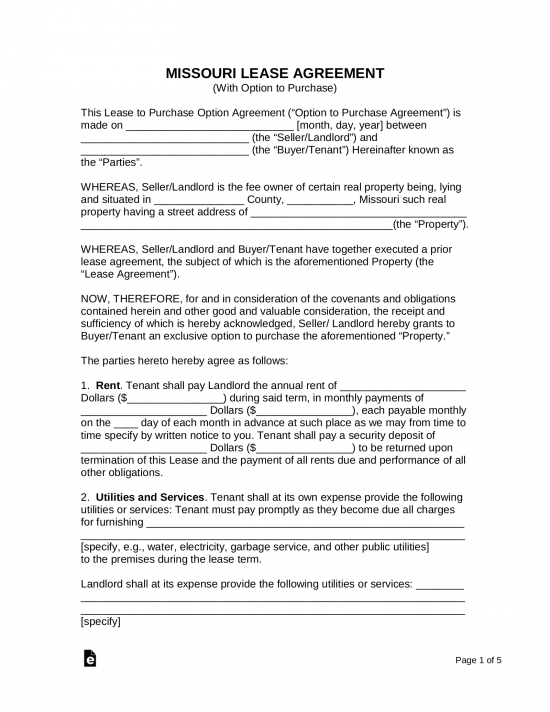 Rent-to-Own Lease Agreement – Standard residential contract with language providing for the purchase of the property if the tenant chooses to buy. Rent-to-Own Lease Agreement – Standard residential contract with language providing for the purchase of the property if the tenant chooses to buy.
Download: PDF, MS Word, OpenDocument |
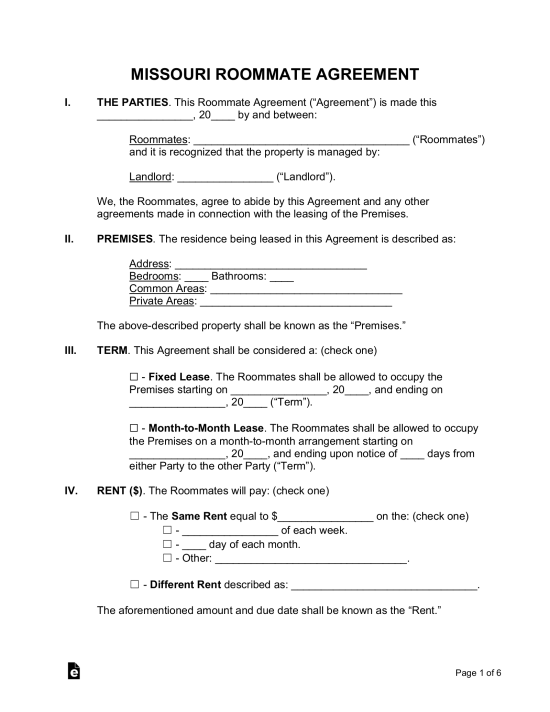 Room Rental (Roommate) Agreement – For individuals sharing common areas within one dwelling. Room Rental (Roommate) Agreement – For individuals sharing common areas within one dwelling.
Download: PDF, MS Word, OpenDocument |
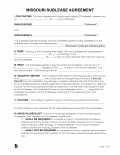 Sublease Agreement – For the purpose of a tenant that is legally bound to an existing arrangement with the landlord and would like another individual to fill in and pay rent until the end of their term. Sublease Agreement – For the purpose of a tenant that is legally bound to an existing arrangement with the landlord and would like another individual to fill in and pay rent until the end of their term.
Download: PDF, MS Word, OpenDocument |
Required Disclosures (1)
- Lead-Based Paint Disclosure – Per federal law, this disclosure is required from any landlord whose housing unit was built prior to 1978.
Security Deposits
Maximum Amount – The landlord may not demand more than 2 months’ rent for the security deposit.[1]
Collecting Interest – Any interest earned on the security deposit belongs to the landlord. Missouri law does not require the landlord to pay this interest to the tenant.[2]
Returning – The landlord must return the security deposit to the tenant within 30 days of the end of tenancy.[3]
- Itemized List – If any portion of the security deposit is withheld to cover the costs of damage to the unit, the landlord must furnish an itemized list of damages to the last known address of the tenant.[4]
When is Rent Due?
Grace Period – Missouri state law does not establish a grace period for the late payment of rent. Rent is due on the date agreed upon in the lease.
Maximum Late Fee – There is no maximum late fee that a landlord may impose in the state of Missouri. However, such a fee must be mentioned in the lease beforehand.
NSF Fee – $25 for amounts less than $100, $50 for checks of$100-$250, and for $250 or more is 10% of the total check amount or $75, whichever is less.[5]
Withholding Rent – If a condition on the premises violates the building or housing code, and detrimentally affects the habitability of the premises, then the tenant may give the landlord 14 days’ notice of their intent to repair the condition at the landlord’s expense. The tenant may withhold up to one-half of a month’s rent for this purpose.[6]
Abandonment
Absence – A rental unit may be considered abandoned if rent has been unpaid for 30 days and the tenant fails to respond within 10 days to written notice from the landlord that they believe the tenant has vacated the premises.[7]
Breaking the Lease – If the tenant is a victim or is in imminent danger of domestic violence, sexual assault, or stalking, they may break the lease without being liable for the remaining rent. However, the landlord may impose a reasonable termination fee.[8]
Tenant’s Utility Shutoff – If the tenant’s failure to maintain utilities on the property constitutes a violation of the lease, then the landlord may initiate eviction proceedings and give 10 days’ notice to vacate the premises.[9]
Unclaimed Property – If the tenant abandons the rental property and leaves behind unclaimed personal property, the landlord may dispose of that property without liability to the tenant.[7]

